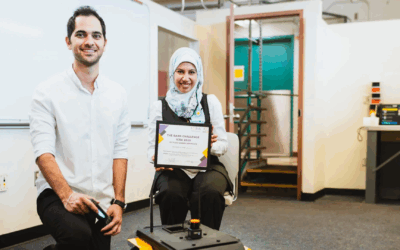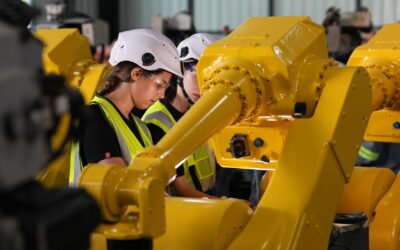SOUTHFIELD — Teams from Florida in the United States and China, Hong Kong, Mexico, and Taiwan internationally, earned first-place awards at Lawrence Technological University’s 2025 Robofest World Championships, held over the weekend on LTU’s Southfield campus.
Members of high school teams competed for scholarships from Lawrence Tech worth up to $80,000 over four years, should they decide to make LTU their college choice.
More than 700 students, and their parents and coaches, from 22 countries attended.
Robofest is a series of robotics competitions for students from 4th through 12th grades. Robofest differs from other robotics competitions in that all robots competing are completely autonomous, controlled only by software developed by team members—just like robots in real-world industrial settings. Also, barriers to entry are low—the registration fee is only $75, and any robot kit and programming language can be used. A basic robot kit costs approximately $400.
The most popular Robofest competition is the Game event, in which robots are designed and programmed to accomplish a specific task that changes each year of competition, with some mission requirements revealed to competitors just prior to the event.
The 2025 Game competition was Robot Parking Valet, in which competing robots had to retrieve a “car key” from a rack, and move it, and a “car” (a cardboard box), past obstacles to a designated position on a six-foot table.
Winning the senior (grades 9-12) Game competition was team CCASS-GAME from Hong Kong. Finishing second was Team Right Heart from Kaosiung, Taiwan. In third was Team Legacy from Kumasi, Ghana. Winning the junior (grades 5-8) Game competition was team Justice from Kaosiung, Taiwan. Second place went to Team Rocket from Plymouth, Mich., while third was claimed by Team SpeedySnail 5.0 from Troy, Mich.
Read the article in full here.
Kyoung-Yun Joseph Kim is a professor in the Department of Industrial and Systems Engineering at Wayne State University, where he directs the Computational Intelligence and Design Informatics (CInDI) Laboratory. Dr. Kim’s research focuses on Design Science; Design Informatics; Semantic Assembly Design; Welding and Joining; and Smart Manufacturing. Dr. Kim is a Fellow of the Society of Design and Process Science. He currently serves Editor-in-Chief of Journal of Integrated Design and Process Science.Dr. Jeremy L. Rickli received his B.S. and M.S. Degrees in Mechanical Engineering from Michigan Technological University in 2006 and 2008 and received his Ph.D. in Industrial and Systems Engineering from Virginia Tech prior to joining Wayne State in 2013. At Wayne State, he has created the Manufacturing and Remanufacturing Systems Laboratory (MaRSLab). MaRSLab targets fundamental and applied research in manufacturing, remanufacturing, and disassembly processes and systems while encouraging considerations for sustainability and life-cycle thinking in design, manufacturing, use, and recovery.




